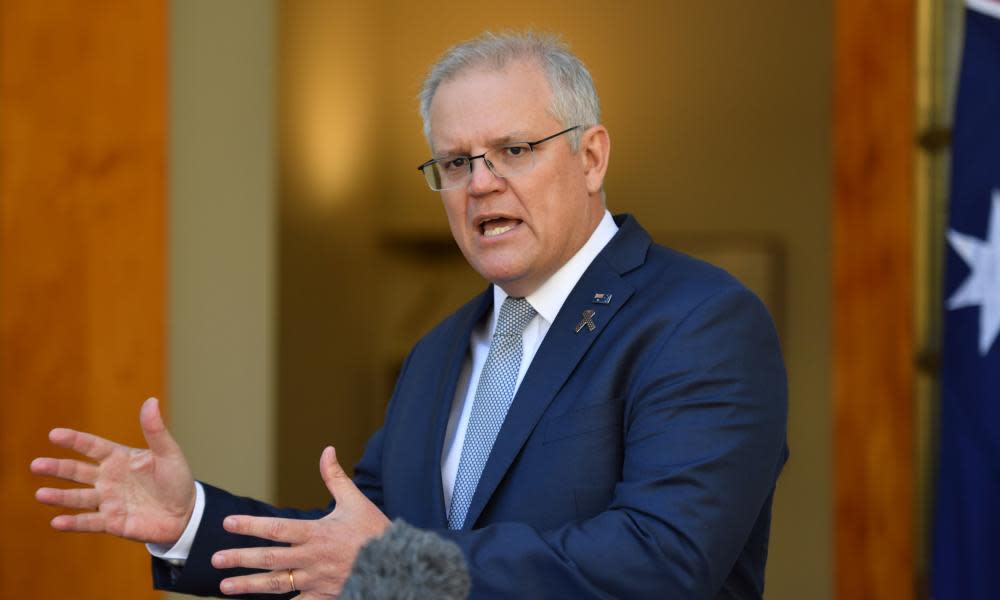Federal budget to include income tax cuts and $1.4bn manufacturing boost

Scott Morrison will on Thursday confirm next week’s budget will include income tax cuts and a $1.4bn program to boost local manufacturing in a bid to fix vulnerabilities in supply chains.
The prime minister will unveil the Coalition’s manufacturing reboot during a budget scene-setter at the National Press Club that will flag “more” tax cuts for businesses and individuals and changes to research and development incentives on 6 October.
The prime minister will identify six priority sectors for Australian manufacturing, and promise grant funding of more than $1bn to help commercialise ideas, generate economies of scale and integrate manufactured goods into global supply chains.
The manufacturing package includes a $1.3bn co-investment fund for large projects in the priority sectors, which are resources technology and critical minerals processing, food and beverages, medical products, recycling and clean energy, defence and space.
Related: Albanese says Coalition should use budget to invest in social housing, skills and manufacturing
Morrison will say the program will support collaboration, commercialisation and the integration of products into local or global supply chains.
An additional $107.2m will be directed towards strengthening supply chains that have been profoundly disrupted during the pandemic. Government briefing materials indicate the early focus of that investment will be on medicines and medical equipment, followed by products such as food, chemicals and plastics.
Businesses will have to work up sovereign manufacturing capability plans identifying specific vulnerabilities in order to qualify for assistance.
The government will also top up a pre-existing manufacturing modernisation fund by $52.8m. Under that program, eligible small-to-medium businesses can apply for grants of between $50,000 and $1m. Round two will see grants of between $100,000 and $1m with a co-funding requirement for businesses.
This program will be open for applications before the end of the year, but the new programs won’t be operational until the first half of 2021.
The prime minister will, according to a copy of his speech circulated in advance, argue that the lessons of the pandemic are self-evident, and Australia cannot “ignore the obvious”.
“The efficiency benefits of hyper-globalisation and highly fragmented supply chains can evaporate quickly in the event of a major global shock like the Covid-19 pandemic,” Morrison will say.
“Armed with this experience, it is only sensible that Australia consider more options to guard against supply chain vulnerability for critical necessities and to secure us against future shocks.”
But while the manufacturing reboot will clearly boost some sectors and not others, Morrison will argue the strategy does not amount to protectionism. “The current crisis is not an excuse for protectionist policies that subsidise inefficient firms and industries.”
He will say Australia needs to be strategic in the way we approach industry policy. Morrison will say the lesson from comparable countries like Singapore, the United Kingdom, Germany and Canada is “we cannot and should not seek to reach global scale in a large number of sectors”.
Morrison will flag the development of 10-year roadmaps with industry for the priority sectors to “act as a guide for future investment and action from both government and industry”. The prime minister will say he wants this process completed by April 2021.
The prime minister will situate the manufacturing plan as part of broader strategy to drive economic growth, including tax cuts, labour market deregulation, cutting business regulations and investment in infrastructure.
He will define the objective of next week’s budget as cushioning the blow of the pandemic recession and recovering what has been lost, while taking “new ground by rebuilding our economy for the future”.
Related: Coalition eyes Australian 'economic sovereignty' with boost to manufacturing
“Never before have we experienced a global recession of this magnitude in a truly modern, interconnected world economy, no longer insulated or constrained by geography and old technology,” Morrison will say. “So this budget will be necessarily different in scale to those we have seen for generations.”
Morrison will say he wants to set a framework for the next decade where business, employees and unions, all tiers of government, “capital, including superannuation funds, and our scientific and research community are pulling in the one direction”.
“You can invest all the resources you like in industry programs, but if taxes are too high, industrial relations systems are too complicated, the adoption of digital technology is patchy, energy is too expensive, approvals take too long and are too costly, the roads are clogged, employees do not have the right skills, and you are shut out of overseas markets – you are wasting your time,” Morrison will say.
If manufacturing is to thrive, Australia “must become a more competitive place for manufacturers to do business, whether it be aluminium smelting in Gladstone, steel processing in Port Kembla and Whyalla, ethanol production in Shoalhaven Heads, fertiliser production in Mount Isa, aerospace at Fishermans Bend or ships at Port Adelaide and Henderson”.

 Yahoo News
Yahoo News 
